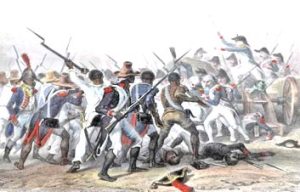
The 1804 Haitian revolution, organized by slaves, defeated the French, British, and Spanish imperialist armies. It ended slavery in Haiti. For the first time in history, rural industrial workers rebelled against rising capitalism and took their destiny in their own hands. Inspired by the most advanced ideas of the French revolution, they took them further.
Five hundred thousand Black Haitians represented the biggest force of agricultural industrial workers in the world at that time. They produced sugar cane for the international capitalist market. French finance capital invested heavily. By super-exploiting slave labor, Haiti became the richest colony in the world—for the enslavers and imperialists.
The first phase of the revolution lasted for eleven years of struggle. One hundred fifty thousand enslaved people (nearly a third of the population) were killed. They killed many enslavers and overseers. They burned everything on the sugar cane plantations. They outlawed slavery after defeating their enslavers, the French financiers that sent their “best” troops to re-enslave them, and the mixed-race exploiters who tried to replace the French. Many men and women led this battle.
The masses who revolted against slavery included tens of thousands of soldiers. They were among the forty thousand enslaved people imported from Africa annually in the decade prior to the revolution. Defeated soldiers steeled in battle were sold into slavery. They used their skills to give critical military leadership to defeat the world’s three best armies.
The government that came to power in 1804 represented the new Haitian capitalist ruling class. They had helped destroy slavery, but not exploitation. They were eager to recreate the “sugar- cane factories.” They wanted the revolutionary Haitian masses to go back to work as “free” wage slaves.
The masses refused to be wage slaves! This was the second phase of the Haitian revolution, which makes it the world’s least publicized revolution. Its lessons have been largely ignored even by the international communist movement. For the first time in history, masses of workers rebelled against wage slavery. It was the first proletarian revolution.
The masses burned the remaining plantations and fled to the mountains. There they organized collective community farming. For the next 110 years, the Haitian masses produced food for themselves, not for the capitalist-imperialist market. The population increased five-fold. There was no hunger. Nobody was homeless. Health and life span dramatically improved.
This showed that agricultural workers are a powerful revolutionary force. The Russian Revolution ignored this, but the Chinese Revolution again proved it correct. It showed that the most oppressed working masses will mobilize to defeat racist capitalism and imperialism. And then organize and struggle to produce for their own needs.
US imperialism invaded Haiti in 1915. It forced Haitian workers into wage slavery to pay the debt the French imperialists claimed they “owed” them for “stealing” French property: the slaves that won their freedom on the battle fields! They also wanted to prevent Haiti from being a beacon to the masses of wage slaves in the Caribbean and worldwide.
The conditions imposed on the Haitian masses were punishment for defeating Europe’s armies and ending slavery. They also earned the hatred and contempt of the Black capitalists who wanted to use the masses as docile wage slaves to become rich.
Since 1915, US imperialism has dominated Haiti and driven the masses into poverty. Today, US-armed paramilitary gangs attack the masses and compete for the power to exploit them. The US government is preparing a multi-national occupation force led by a thousand Kenyan police to control the masses and prevent rebellion.
But many neighborhood collectives are defending the masses against the gangs and police. It is a racist imperialist lie that Haiti suffers from lack of leadership. US and French imperialist repression has not stopped workers from risking their lives to lead and defend each other.
The many collective defenders could become collectives of ICWP to mobilize the masses for communist revolution, to end wage slavery and racism, and to build communism. To win over soldiers. To plan, produce, and share only for the masses’ needs.
Haitian workers’ situation cries out for a mass revolutionary communist party to mobilize the masses for communism, nothing less. The Haitian masses’ heroic revolution shows that they can defeat the capitalists and imperialists and produce what they need without exploiters. This time they will abolish wage slavery and bury capitalism-imperialism forever.
Read our pamphlet :
To End Racism, Mobilize the Masses for Communism

